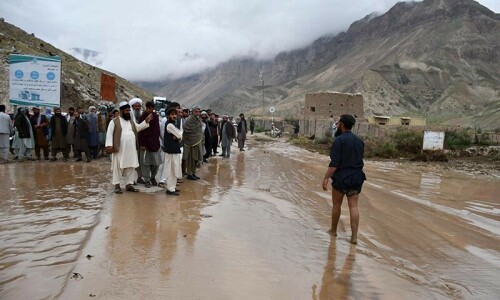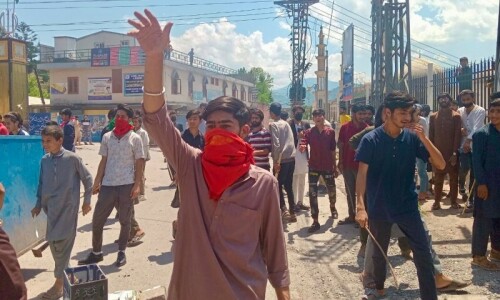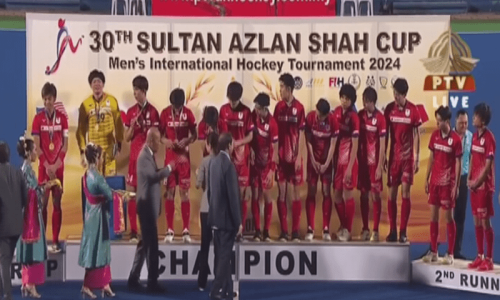WASHINGTON: The White House coordinated a multi-front effort last year to help Enron Corp settle a dispute with the Indian government, which the energy company hoped would deliver $2.3 billion as it was running out of cash in the weeks before declaring bankruptcy.
According to government records released on Friday, President Bush’s National Security Council led a “working group” with officials from various Cabinet agencies to resolve Enron’s troubles over a power plant venture. Enron, facing nonpayment by its Indian government customer, wanted to sell its interest for $2.3 billion.
The administration’s efforts; which included Vice President Cheney’s conversation with an Indian official and were to involve a personal appeal by Bush to Indian Prime Minister Atal Bihari Vajpayee; appeared to end on Nov 8. That is the day Enron filed documents with the Securities and Exchange Commission revising its financial statements to account for $586 million in losses. It is also the day Enron Chairman Kenneth L. Lay talked by phone with Treasury Secretary Paul H. O’Neill about the company’s dire finances.
The documents released on Friday provided new details about Bush administration efforts to aid Enron, the once highflying company that filed for bankruptcy law protection in December and now faces Justice Department and congressional investigations. The India episode demonstrates the ability of Enron; once one of the nation’s most aggressive and innovative firms, and one of the biggest political donors; to command the attention, and sometimes the intervention, of the nation’s highest government officials.
Administration officials say their efforts were appropriate and unremarkable, intended primarily to protect US taxpayers’ $640 million interest in the troubled Dabhol power plant. White House press secretary Ari Fleischer said on Friday: “It’s not uncommon for leaders of the United States, no matter what party they are, to help make certain that if contracts are to be awarded overseas, they’re given to Americans. There’s a lot of competition.”
The $3 billion power plant, located south of Mumbai, was built as India began to open its heavily state-run economy and allow foreign firms greater investment opportunities. The nation’s biggest foreign investment by far, the plant was highly controversial from the start. It drew opposition from environmentalists, Indian nationalists and even the World Bank.
The project is “not economically viable,” Heinz Vergin, the World Bank’s country director for India, wrote in April 1993, rejecting a request for a bank loan.
Enron sought to sell its 65 per cent interest in the Dabhol plant after years of squabbling with the plant’s lone customer, the Maharashtra State Electricity Board. In a Sept. 14 letter to Vajpayee, Lay said he wanted $1.2 billion for the cost of the company’s investment and $1.1 billion for the purchase of offshore lenders’ debt.
At that same time, the administration working group was trying to resolve the dispute between Enron and India.
“The acute lack of progress in this matter has forced Dabhol to rise to the highest levels of the United States government,” OPIC President Peter Watson said in a Nov 6 message to a top Vajpayee aide, Brajesh Mishra. “I ask that you give this matter serious and immediate attention.”
The documents do not make clear whether the Bush administration was pressuring India to release Enron from the project or to reach another settlement.
Fleischer said the administration’s actions had nothing to do with Enron’s political contributions. He noted that the Clinton administration had acted in a similar manner on Dabhol.
According to the Centre for Public Integrity, Lay accompanied Clinton’s commerce secretary, Ronald H. Brown, on a trip to India in 1995. In 1994, Enron executive Rodney L. Gray joined Brown on a trip to Russia. Clinton administration officials said they felt obliged to champion Enron’s cause because Maharashtra state had effectively reneged on its contractual obligations to pay for the plant’s output.
By last summer, documents show, the National Security Council was intimately involved in discussions about the plant. A June 28, 2001, e-mail from an NSC staffer announced there was “good news” regarding Enron and Cheney: “The Veep mentioned ENRON in his meeting with Sonia Gandhi”; the president of India’s opposition Congress Party.—Dawn/LAT-WP News Service (c) The Washington Post.













































Dear visitor, the comments section is undergoing an overhaul and will return soon.